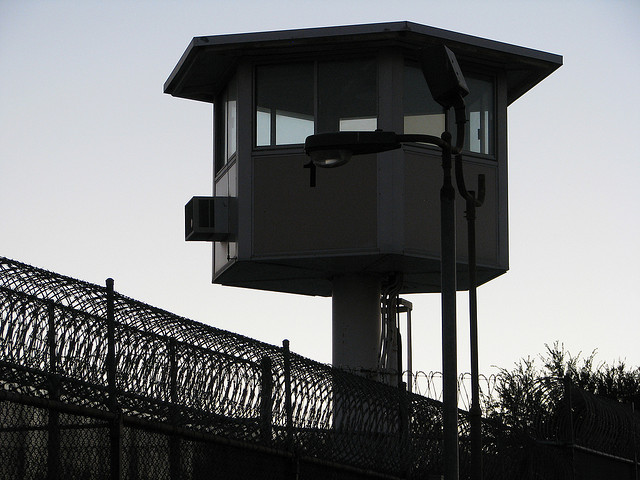Narrative Lectionary for September 21, 2014
Genesis 39:1-23 “Joseph in Prison”
The chief jailer committed to Joseph’s care all the prisoners who were in the prison, and whatever was done there, he was the one who did it. The chief jailer paid no heed to anything that was in Joseph’s care, because the LORD was with him; and whatever he did, the LORD made it prosper. Genesis 39:22-23
There are clearly a lot of ways to work with the reading this week; it is rich in possibility with many potential lessons and explorations into social justice, integrity, and even stewardship. Yes, even stewardship.
We hear a lot about prosperity gospel in the preaching and teaching of some of the more popular celebrity church leaders of our time. From their designer clothes, mansions, and  fancy cars to their lavish worship productions and well-oiled websites, these leaders exude a sense of being favored by God. Does God truly desire to prosper the faithful? And just what does “prosper” mean and how did that 14th century word derived from the Latin “prosperus” or “favorable” come to define the desired state of God’s faithful people?
fancy cars to their lavish worship productions and well-oiled websites, these leaders exude a sense of being favored by God. Does God truly desire to prosper the faithful? And just what does “prosper” mean and how did that 14th century word derived from the Latin “prosperus” or “favorable” come to define the desired state of God’s faithful people?
Will they know we are Christians by our Rolexes and stock portfolios? Does financial and personal success signal a favored status by the Divine One? Most mainline folk would say “Of course not! That’s ludicrous.” But then most mainline denominational members speak from a place (or places) of privilege. How might the promise of God’s favor sound to the downtrodden and marginalized? Could it have the scent of snake oil or the power to crush even further the hopes and dreams of destitute?
And what does the story of Joseph in Egypt have to say about stewardship, hardship, and prosperity? Quite a lot actually. Joseph, a flawed but beloved character, ends up saying the wrong things, being in the wrong place, and even wearing the wrong clothes–situations that lead to his attempted murder, false accusations, and imprisonment. Yet, along the way, he still manages to “prosper.” Yep, there’s that loaded word again. From the narrative it seems as though everything is flourishing in spite of the many difficulties Joseph faces. One just can’t keep a good man down. Even in prison, Joseph ends up looking good.
This isn’t the way the “real world” or at least “our world” works. Truth be told it probably wasn’t the way the world worked in Joseph’s day either. We know that our prison system is broken and unjust. We know that bad things happen to good people, and most times without a happy, storybook ending. What we have in this story is a narrative of faithfulness and words about the nature of God. God is faithful to Joseph even when things go south. God makes a way, and Joseph perseveres. Joseph does the best he can with the resources and situations in which he finds himself. That sounds a lot like stewardship to me. It’s
 not about prosperity as we define it today and more about prospering in place–flourishing in good soil or amongst the cracks and pieces of broken pavement and shattered dreams. With God all things are possible. With God there is always abundance.
not about prosperity as we define it today and more about prospering in place–flourishing in good soil or amongst the cracks and pieces of broken pavement and shattered dreams. With God all things are possible. With God there is always abundance.
Believe me, I don’t mean to make light of the harrowing and soul-crushing situations that a goodly portion of our brothers and sisters deal with on a daily basis. Nor do I in any way intend to glorify some shallow notion of divine providence reflected in the worldly successes of a lucky few. What I do believe is that God desires good for us. Our Creator desires for us to prosper in a culture of abundant grace and mercy, meaningful relationships, and the beloved community. The Lord is with us, too, in times of plenty and in times of dire need. May you be strengthened in the light of God’s abundant love, and may you be equipped to share this good news with others.
In Worship
Could this be an opportunity to talk about the criminal justice system in North America? One resource that might prove helpful is the ELCA’s Social Statement “The Church and Criminal Justice: Hearing the Cries.” Consider crafting a litany or lament that incorporates some facts from this document or those of other denominational bodies. Perhaps make this a gateway to a series of adult forums on the issue or to examine possibilities for ministries that address the needs of those affected by the criminal justice system.
With Youth
Some in your youth group may have read the Lemony Snicket (Daniel Handler) book series, A Series of Unfortunate Events, or at least have seen the movie by the same name. In the series, the three Baudelaire orphans face a series of catastrophic events beginning with the death of their parents in a suspicious fire. Some might look the events of the Joseph story as having some similarities–albeit not quite so gothic in nature. Bad things do happen to good people, but with God bad/evil does not get the last word. Just as the Baudelaire orphans manage to survive and thrive, so does Joseph. Consider modern examples with which youth might be familiar. What common threads do they see? Where is the hope–the examples of prospering in the face of seeming and crushing defeat?
With Children
Ask the children if they’ve ever been accused of something they did not do. Most of them can relate a story where this has happened. How does it make them feel? What was the result? Did anyone have a happy ending to their story? Tell them about Joseph being accused of doing something he didn’t do and how he ended up in prison. Yet instead of letting it defeat him, we know that God was still with him, guiding, equipping, and helping him. And even in prison, Joseph was able to experience good things. Invite the children to look for God in all situations–to trust that God desires good for them and will not forsake them.
(Photos: rennett stowe, chedder, and o, Creative Commons. Thanks!)




Leave a Reply